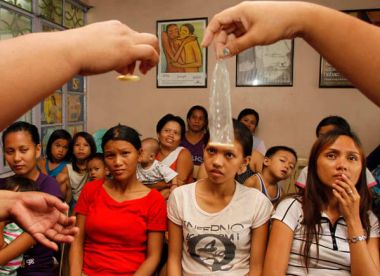Sex education
Sex education is a broad term used to describe education about human sexual anatomy, sexual reproduction, sexual intercourse, and other aspects of human sexual behavior.
Countries with more conservative attitudes towards sex education (including the UK and the U.S.) have a higher incidence of STDs and teenage pregnancy. 
Sex education helps people gain the information, skills and motivation to make healthy decisions about sex and sexuality. Planned Parenthood is the nation’s largest provider of sex education, reaching 1.2 million people a year.
Sexuality education aims to develop and strengthen the ability of children and young people to make conscious, satisfying, healthy and respectful choices regarding relationships, sexuality and emotional and physical health.
Sexuality education does not encourage children and young people to have sex.
Sex education is a teaching therapy on problems related to human sexual behavior, including emotional responsibilities and relationships, sexual activity, age of consent, human sexual anatomy, reproductive rights, reproductive age, birth control, safe sex and sexual abstinence. Information about cases is also included.
If we talk about Grandfather’s time, then these things were not given much attention at that time. Apart from this, no one liked to talk about it before marriage. If anyone wants to talk about this, then it is wrong for the society. There have been many controversies regarding sex education. But today everyone has become responsible for their health, so everyone is aware of health. Women and men of villages and cities are being given information about sexual health. So that we can avoid sexually transmitted diseases and infections, HIV, AIDS etc. and make our future good.
WHO has been working in the area of sexual health since at least 1974, when the deliberations of an expert committee resulted in the publication of a technical report entitled “Education and treatment in human sexuality” (WHO, 1975).
WHAT ARE THE BENEFITS OF SEXUALITY EDUCATION?
Sexuality education delivered within a safe and enabling learning environment and alongside access to health services has a positive and life-long effect on the health and well-being of young people.
• Sexuality education has positive effects, including increasing young people’s knowledge and improving their attitudes related to sexual and reproductive health and behaviors.
• Promoting and implementing well-designed SHE programs positively impacts student health in a variety of ways. Students who participate in these programs are more likely to:
Delay initiation of sexual intercourse
Have fewer sex partners
Have fewer experiences of unprotected sex
Increase their use of protection, specifically condoms
Improve their academic performance.
• Health Benefit
This action has many health benefits for women. This action brings about many emotional changes in women. Their impact is always positive, for both men and women. Women get all these benefits like healthy hair, healthy skin etc.
• Maintains Mental Health
Sex also helps in keeping the mood of women right and in relieving stress. It is a loving relationship. Due to this, the mental health of women remains good. Due to mental stress, the hormone cortisol increases. Due to this hormone, there are problems like increase in blood pressure, gas formation etc. With the help of sex, stress is reduced in women and she also stays away from these problems.
Sexual health and sex education information?
Woman’s Sexual Health:
Women have been given sex-related information. But women need to be aware of sex organs. Vagina – The vagina is the inner part of women’s genitalia. It remains attached to the uterus and intercourse takes place here. Menstruation and birth of the child takes place from this place.
Breast – Breast is the main part of the chest of women. It contains fatty nerves and nipples. Women’s breasts grow in the adolescent stage and after the baby is born, the function of breastfeeding.
Uterus – The uterus is located in the lower part of the woman’s abdomen. It is shaped like a pear and a closed fist. It is attached to the top end of the vagina and to the fallopian tubes. Egg development takes place at this place. Apart from this, the lining of the menstrual cycle is formed in the uterus and comes out through the blood flow every month.
Vagina Mouth – The vagina is the outer part of a woman. In other words it is also called clitoris. It is like the lips on the genitals, which helps to keep the vagina lubricated.
Hymen – The hymen is like a membrane inside the vagina of women. This membrane narrows the vaginal tract of women. Many times this membrane breaks due to having sex with women.
Men’s Sexual Health:
Men have been given information about sex organs and diseases.
Penis – The reproductive part of the male is called the Penis. This organ is made up of soft tissues. When this tissue is stimulated, it fills with blood. This tissue stimulates the penis and removes urine, fluid and semen from the penis.
Stimulation in male genitalia – Due to stimulation in the genitals of men, the penis becomes enlarged and blood is filled in it. Because the penis enlarges from its normal position. Ejaculation – The process of semen coming out after sexual activity is called ejaculation. This ejaculatory substance comes out from the woman’s orgasmic vagina.
Circumcision – The upper skin of a man’s penis is completely removed. This is a custom of some religion which is followed for many years.
Semen – This is a white colored fluid coming out of the genitals of a man. It contains sperm and fluid. This substance is released from the prostate gland of the man. This substance is released when a man is aroused. According to some scientists, the number of spermatozoa is 20 to 300 million.
Testicles – The testicles are a major part of the male genitalia, which are shaped like two circles below the penis. It is also called scrotal sac. Which makes male hormones and the testicles are connected to many nerves. It has small veins which are like threads. It produces sperm. It is very delicate.
Testicular cancer – Cancer of the testicles is called testicular cancer. This cancer has been found in very few men in India. However, it is seen in men after the age of 40.
Sex Education For Children According To Their Age
Often parents do not consider it necessary to give any information about sex to their children thinking that their parents did not tell them anything about it… but often our thinking proves to be harmful for the children.
Whether or not we give sex education to our children, but half-baked and provocative information about sex from pornographic magazines, TV, movies, the Internet, even toilet walls meant to mislead them. This is enough for them. At that their fickle mind starts experimenting with sex without knowing the immaturity of its body and in many cases even achieves it… and what is the result? Many physical and mental diseases, self-blame, remorse… and loss of studies, career is different…
• Through sex education, children develop an understanding of better physical relations, so that they can avoid taking steps in the wrong direction.
• Sex education also helps children understand what the right age for participation in sexual activity is and how harmful it can be to participate in this activity before the right age.
• Children between the ages of 2 and 5 are goofy. So they have no idea of the evil intentions of the people. This is the reason that people of perverted mentality easily sexually abuse children of this age. In such a situation, it is necessary that children of this age should be explained about good and bad touch.
• Children aged 5 to 8 years. Children of this age are very developed mentally. In such a situation, they can pay proper attention to your words and can also understand your words. So it can be easier to explain to children of this age. During this time, whatever you want to tell them regarding sex education given to children, they will seriously listen and understand.
• Children 5 to 8 years old. Children of this age are able to understand social and behavioral to a great extent and learn to connect with people emotionally. So with children of this age you can openly talk about sexual activity and sex education issues. You can explain to them the effects and consequences of sexual activity. Issues such as post-menstrual pregnancy, sexual dysfunction and HIV can be discussed. With this you can understand the thoughts about sexual activity in your children’s mind. This will give you a chance to change and improve your children’s views. You will also be able to easily explain to them the importance and seriousness of a physical relationship. Girls of this age can also be introduced to information related to menstruation. Also, boys can be given information related to the age and severity of the correct sexual activity, so that in future no illegitimate step can be taken due to wrong information.
• Children between 14 and 19 years old. This is a stage of the age, when every child has an attraction towards the opposite sex and there is a strong desire to know about it. This curiosity and a strong desire to know can lead children in the wrong direction. Therefore, it is very important to give proper sex education to children at this stage of age, so that they can understand some important aspects related to sexual activity in a better way. These may include topics such as the correct age of sexual activity, safety during sexual activity, the risks of sexual activity and the use of birth control pills. Along with this, the benefit of sex education will also be that children will be able to talk to you openly related to sexual activity and will also be able to get the right solution to their doubts.
Why is sex education important?
Although, even if we do not tell, children get information about sex through friends, magazines or internet, yet why we should give sex education to them, let us know-
* They can have complete information about their body.
* They can talk and behave by being comfortable with both the boy and the girl.
* Can understand sexual exploitation, rape etc. happening with them or with any other and can cooperate in preventing it.
* Be prepared to know and understand the physical, mental, emotional, sexual changes that occur in adolescence.
* Later on, when the feeling of sex arises in their mind, then they can take it in a healthy way and no guilt should arise in their mind about it.
* To be aware about the prevention of STD (Sexually Transmitted Disease).
* To lead a happy married life in the future and be able to fulfill the responsibility of an ideal parent.
Importance of sex education
A proper sex education will nurture good values and not leave a bad impression to the kids. Most counselors take precaution on how to present this sensitive topic to kids because a single mistake may give them a wrong idea about sex. Many people in our society believe that sex education should only be restricted to families, that parents should personally take up the issue and educate their children. This view does not make any sense; this education needs a proper channel through which it should reach everyone.
Sexuality education does not deprive children of their ‘innocence’. Giving children information on sexuality that is scientifically accurate, non-judgmental, age-appropriate and complete, as part of a carefully phased process from the beginning of formal schooling (including kindergarten and pre-school) is something from which children can benefit.
Early onset of puberty in boys and girls and increasing exposure to sexual content via television and the internet makes it necessary to introduce sex education to students at a reasonably early age.
Many schools nowadays prefer to address sexual abuse and its prevention in classes II and III so that young children have the basic knowledge to identify if they are being sexually exploited and can seek help at the right time.
Conclusion
State and local policymakers should modernize and rethink sex education programs in public schools to help better prepare students for the complex world in which they live. Through new legislation and updated state standards, policymakers should encourage sex education requirements that include instruction on healthy relationships, communication, intimacy, consent, and sexual assault prevention. Without formal and comprehensive sex education that includes this information, states are missing a prime opportunity to arm young people with quality information that would help them make safe, healthy choices. Such choices have the potential to have positive impacts on students’ emotional well-being and future relationships.
IN CASE, IF YOU HAVE ANY QUERY OR CONCERN RELATED TO ANY HEALTH RELATED PROBLEMS, YOU MAY DIRECTLY ASSOCIATE TO ME.




